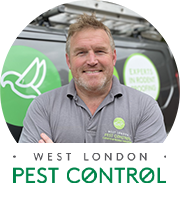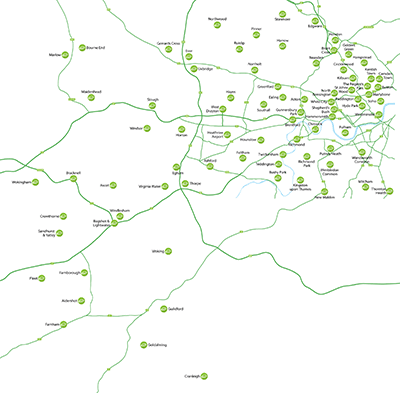West London Pest Control - Bird, Pigeon & Seagull Control & Bird Proofing Services in West London
Birds are normally welcome in gardens and woodlands across the UK but, like all other animals, birds and insects, should their numbers swell, with one species out doing the other, the results for us can be unpleasant. A large amount of birds roosting and nesting in one place, close or in our homes, can also present a health hazard.
Birds are everywhere! Surely there is not much that can be done?
We hear this all the time but, the good news is, that there are measures that can be taken to help you live your life without being plagued by unwanted birds, pigeons or seagulls.



The problems they cause…
Birds can not only be a nuisance, but can cause damage too:
- Bird droppings are acidic – and we all know the corrosive effects of acid! The same is true for bird droppings that allowed to accumulate on buildings over a period of time. Bird droppings will ‘eat away’ at the building material, causing not only unsightly stains but will also damage and leaks, depending on the material. There have been extreme cases where some roofs have collapsed due to the weight of bird droppings being allowed to build over many years!
- Nests – birds can nests in all kinds of places and not just trees. The guttering system on a property, along with drains, chimney stacks etc. all make great places for birds, from pigeons through to starlings, to make their nests but, they are effectively blocking the run off of rainwater from your property. This can lead to expensive damage from where water seeps in to the interior of the property, as well as the birds damaging the gutters as they land and take off etc.
- Damage to machinery – where birds nest and roost, there will always be a problem with droppings falling on to items underneath; in warehouses and other cavernous spaces, the droppings can be falling on to machinery and other important items. Clearly, the health implications of working around bird droppings need to be considered too.
- Health & safety – there have been cases of people becoming ill after prolonged exposure to dried bird droppings but, not only this, fresh bird droppings can be unsightly and slippery underfoot.
- Foodstuffs – for both farmers and urban warehouses storing foodstuffs, for both animal and human consumption, contamination by bird droppings is a distinct possibility if birds have managed to gain access to the interior of a building.
- Derelict properties – properties left vacant for long periods of time can attract birds to flock and nest in it. Over time, the damage caused by their droppings, as well as the weight of accumulating droppings can cause some parts of the building to become unsafe or collapse completely.



How can birds, pigeons and seagulls be stopped from causing so much damage?
It can seem an impossible task, controlling the population of birds, pigeons and seagulls on properties in both urban and rural areas. However, it is a possibility but, unlike other pest control and eradication solutions, it takes long terms solutions rather than a ‘quick fix’.
There are several ways to control and discourage birds from finding your property so attractive…
- Spikes – you may have seen bird spikes on top of lampposts and other high street furniture that humanely prevent birds from roosting or sitting on items. These come in a variety of shapes and can be used on a variety of ledges and the like too
- Gutter planes – guttering is susceptible to damage and being blocked by debris and nests; there are a variety of items that can be fixed to gutters to prevent them from being used as nesting sites. A recent invention are the use of gutter planes, a piece of metal fixed within gutters that prevent the bird from roosting; when the plane feels the weight of the bird it moves, hence the birds fly off
- Netting – again, an increasingly common sight on roof tops, the addition of this netting also prevents birds from roosting or nesting on a property. Again, a long term solution means that the amount you invest in netting will be far less in the overall amount you will pay out in repairs and maintenance
- Chimney cowls – nests in chimneys can be a nuisance in winter, especially if you have an open fire! Having a cowl fitted is essential and means that nesting seagulls, with the adult birds known for ‘dive bombing’ people to ‘protect’ their young, will be discouraged from nesting on your property.



Changing habits
But, we are all encouraged to feed the birds in order to bring in more wildlife into the garden; the way in which we feed the birds, encouraging the ‘right’ species into the garden, is important. Preventing pigeons and seagulls from feeding in the garden means using bird feeders, with bird seed, rather than throwing out scrap food on to the patio or lawn.
You can be free from the nuisance of unwanted birds, pigeons and seagulls in your garden, home or business property! All you need to do is call us and, after a thorough assessment, we can advise on the best way forward for you.







 for W areas
for W areas





